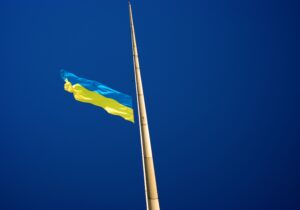There’s a solid piece of wartime journalism on the BBC website. Not only is it powerfully written, it’s reminiscent of the war-correspondent dispatches of the 1940s or even some of the literature that flowed out of the Great War. Perhaps that’s why it’s so powerful. Like all good writing, it points us toward several deeper, bigger truths.
The Smiling 68th
The story is penned by BBC war correspondent Quentin Sommerville. Embedded with the Ukrainian Armed Forces 68th Jaeger Brigade, Sommerville is alongside Ukrainian troops as they wade ever deeper into their country’s Russian-occupied, Russian-razed east and south.
The “fighting has been hard,” he reports as the 68th claws back Ukraine’s territory, village by village. One of those villages is Blahodatne. As Russian artillery shells rain down on Blahodatne, the soldiers seek refuge in a tiny house. Inside, the house is “lit with oil lamps, casting soft yellow light.” There’s an “iron stove with three sturdy pots.” And the owner of the home—Nina Fedorivna—is still living there. Typifying the grit and tenacity the world has come to admire of the Ukrainian people these last 17 months, “She never, for a second, considered leaving the village.”
After the artillery barrage subsides, the soldiers leave Nina’s home. They catch the soft, sweet fragrance of “roses…in bloom.” But the moment is overwhelmed, poisoned, by “the awful smell of corpses.”
The men of the 68th move out and move on to their next objective—an assault east of Blahodatne, “across minefields and directly in the line of Russian fire.”
As the men of the 68th absorb their orders and what those orders might bring, their commanding officer, Sgt. Andrii Onistrat—“tanned and with a brilliant white grin”—locks eyes with his “grim-faced men.” And he delivers one final order: “Smile…We are winning the war.” It calls to mind something historian John Keegan wrote: “Soldiers are not as other men.” Onistrat is proof of that—and clearly the kind of leader men will follow into the hell of battle.
As they mount their assault, Onistrat’s soldiers have to deal with not just the Russian bombs and bullets, as well as the awful smells and sights of rotting corpses, but also with “sweltering” heat and “mosquitoes and horseflies.” No doubt drawn by the stench of decaying bodies, the bugs are so thick that they are “feasting on the men.”
Onistrat wears an American flag on his armor-plated flak jacket and his son’s helmet on his head. During a lull in the fighting, Onistrat tells the combat reporter that the younger Onistrat was killed by a Russian drone strike earlier in the year. He was just 21. When Sommerville asks if the grieving warrior-father wants to exact some measure of revenge, he answers, “Revenge is a sin. My task is to bring this story to an end. I want to take part in the victory parade.” Soldiers are not as other men.
Back to the fighting, the correspondent explains that “The counteroffensive is made more difficult because of the lack of Ukrainian air power. The West has promised F-16 fighter planes, but they will not arrive until later this year.” When he ordered the counteroffensive to begin, President Volodymyr Zelensky noted that without Western planes, Russia would maintain control of the skies and many Ukrainian lives would be lost as a result. “So it has been for the 68th Brigade,” Sommerville grimly reports, confirming Zelensky’s warning.
Even so, Onistrat’s men secure their objective—and take back another chunk of their homeland, another village, another mile of Ukrainian soil.
As they return to a command post away from the front, Onistrat’s vehicle “swerves and comes to a sudden stop.” The soldiers scramble out of their vehicles. Is it a minefield? Another artillery strike? A kamikaze drone attack? “I wonder if we too need to take cover,” Sommerville writes. “Then I see what’s caught their attention—cherry trees. Like kids, they laugh carefree for a moment as they grab handfuls of the dark red fruit from the shady branches, as artillery and mortar fire continues to hammer Russian positions on the hillside.”
Delaying Victory
As for the deeper truths Sommerville’s almost-poetic prose points us toward, the first is actually not particularly deep: Ukraine needs Western warplanes. That was true last year, when U.S. and Western officials maundered and mumbled that Ukrainians couldn’t learn how to fly F-16s, A-10s, or F-18s “in time” to be of any help in the battlespace. It was true when NATO’s hawkish eastern members tried to get their upgraded but aging Soviet-built fighter planes into Ukraine. And it was true last month, when Washington finally relented and gave the allies a greenlight on F-16 deliveries.
The consequences of the delayed delivery of F-16s and other weapons systems are predictable and were predicted. The delays have wasted time and lives—and prolonged the war. In most every case, the things Kiev has requested that initially received a “no” from Washington—Patriot air-defense systems, tanks, HIMARS rocket artillery—have ended up being shipped to Ukraine. And the Ukrainians—clever, tenacious, creative—have used these weapons to great effect. They will do the same once they have F-16s and F-18s.
It calls to mind Churchill’s desperate words to America in early 1941: “Give us the tools…Put your confidence in us. Give us your faith and your blessing, and, under Providence, all will be well. We shall not fail or falter; we shall not weaken or tire. Neither the sudden shock of battle, nor the long-drawn trials of vigilance and exertion will wear us down.”
A nation of Nina Fedorivnas and Andrii Onistrats will not fail or falter.
Light
A second truth revealed in Sommerville’s story flows from something not even mentioned in the article, but rather glimpsed in the article’s anchor photograph: that American flag patch velcroed onto Onistrat’s flak jacket. Seeing an American flag on a Ukrainian uniform comes as no surprise to those of us who follow the war closely. American flag patches seem to be standard issue on the Ukrainian uniform. The American flag can be seen on the helmets of Ukrainian soldiers defending Snake Island and the gear worn by Ukrainian commanders and the bullet-proof vests of the liberators of Kherson—and now on the troops mounting this pivotal counteroffensive into Ukraine’s east and south. Zelensky explains why: “For almost 250 years, the men and women of the United States Armed Forces have prevailed against tyranny, often against great odds . . . Your example inspires Ukrainians today to fight back against Russian tyranny.”
With our classrooms and our culture teaching generations of Americans that America is no better than and perhaps worse than other countries, these images of Ukrainian soldiers wearing our flag as they defend their freedom—along with images from Hong Kong, Havana, Georgia, Belarus, Kosovo and Iraq—serve as a striking and much-needed reminder that America is a great and good country. Sadly, ironically, strangely, and perversely, much of the world is able to see America in a better light than we see ourselves.
Broken
Finally, as with passages from Remarque’s All Quiet on the Western Front, the anecdote about the cherry trees captures the awful incongruities exposed by war—and the brokenness of a world so badly scarred by broken men.
Men like Putin force civilization to choose between the ignominy of surrender and the brutality of war. Ukraine made the right choice, but it is a costly one. War forces men to spend their waking hours fighting, destroying, killing. War poisons their sleep with nightmares. But then they happen upon some beautiful aspect of God’s creation, a few minutes of normalcy, some reminder of the way things should be, some memory of the way things were. And for a moment, they act “like kids.” For Onistrat and his men, it was a cherry tree in the middle of a battlefield. For my grandfather, hungry and tired as he limped somewhere between Normandy and Holland, it was a barnyard full of chickens—a godsend that literally kept him alive.
For a moment, all is well. For a moment, the warriors allow themselves to act like children—or perhaps it’s God’s grace that allows them to act like children. For a moment, the warrior catches a glimpse of the Garden, where man was once in harmony with the Creator.
This isn’t to suggest that all wars are senseless. There is a time for war; just glance at the grim but always-true words of scripture. There are things worse than war; ask the survivors of Dachau or Bucha or Srebrenica or Kigali or Mt. Sinjar. And there are things worth fighting for. Visit Gettysburg or Normandy or Shanksville. Read Abraham Lincoln or Frederick Douglass. Listen to the words of Sgt. Onistrat or his countrymen or his commander-in-chief.
Yet as Sommerville’s dispatch reminds us, war is a terrible scourge, a distortion of the Creator’s design, a waste of the Creator’s crowning creation.
Remember
Keegan wrote in his History of Warfare that “All civilizations owe their origins to the warrior.” But more than that, all civilizations owe their survival to the warrior.
We convince ourselves that reason will somehow persuade the unreasonable, that treaties and communiques will somehow tame those who rule by terror, that our generation is somehow wiser or smarter or better than those who came before us. That is, until civilizations are bloodied and bludgeoned, until places like Kiev and Bucha, Manhattan and Nice, West Berlin and South Korea, Poland and Pearl Harbor and Nanking are shattered by men like Putin and bin Laden, Kim and Stalin, Tojo and Hitler. Only then—when nothing stands between us and death, between us and tyranny, between civilization and the abyss—do we remember how much we need men like Andrii Onistrat.







 Sponsor a student for Christianity & National Security 2024
Sponsor a student for Christianity & National Security 2024